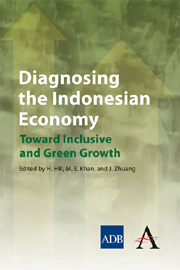Book contents
- Frontmatter
- Foreword
- Preface
- Author Profiles
- Abbreviations and Acronyms
- Contents
- 1 Introduction
- 2 Development Policies and Performance
- 3 Critical Constraints to Growth
- 4 Critical Constraints to Reducing Poverty and Inequality
- 5 Macroeconomic Management
- 6 Industrialization: Patterns, Issues, and Constraints
- 7 Infrastructure Development: Challenges and the Way Forward
- 8 Human Capital and Economic Development
- 9 Economic Growth, Employment Creation, and Poverty Alleviation
- 10 Poverty Reduction: The Track Record and Way Forward
- 11 Decentralization
- 12 Making Indonesia's Growth Green and Resilient
- Index
10 - Poverty Reduction: The Track Record and Way Forward
Published online by Cambridge University Press: 05 May 2012
- Frontmatter
- Foreword
- Preface
- Author Profiles
- Abbreviations and Acronyms
- Contents
- 1 Introduction
- 2 Development Policies and Performance
- 3 Critical Constraints to Growth
- 4 Critical Constraints to Reducing Poverty and Inequality
- 5 Macroeconomic Management
- 6 Industrialization: Patterns, Issues, and Constraints
- 7 Infrastructure Development: Challenges and the Way Forward
- 8 Human Capital and Economic Development
- 9 Economic Growth, Employment Creation, and Poverty Alleviation
- 10 Poverty Reduction: The Track Record and Way Forward
- 11 Decentralization
- 12 Making Indonesia's Growth Green and Resilient
- Index
Summary
Background
Indonesia, the world's largest archipelago, has over 17,000 islands and is home to 230 million people or 3.4% of the world's population. Despite its abundant resources, Indonesia is among the lower middle-income countries, with only $2,254 per capita income in 2008 (World Bank 2009b, 2009c). Since the 1997 Asian financial crisis, efforts to protect the poor through targeted social safety nets for health, education, and rice consumption as well as the newly introduced community and microenterprise empowerment programs have demonstrated Indonesia's development policy agenda. However, Indonesia's progress toward achieving some of the Millennium Development Goals has not been consistent; issues are especially apparent with goals 1–5 and 6C, for reducing multidimensional poverty, covering extreme poverty, food consumption, universal 9-year education, gender equality, maternal and neonatal health and child survival, and malaria and other communicable diseases.
In the National Medium-Term Development Plan (Rencana Pembangunan Jangkah Menengah Nasional—RPJMN) of 2004–2009, the Yudhoyono administration targeted reducing the proportion of Indonesians living below the poverty line from 17.42% in 2004 to 8.20% in 2009, a 9.22 percentage point decrease in 5 years. The 2009 data, however, show that 14.15% of the population, or 32.53 million people, still live below the national poverty line, which is 5.95 percentage points under the government's target. The newly launched RPJMN 2010–2014 has targeted a poverty rate of 8% in 2014, working toward integrated and inclusive development that accommodates issues of localities, geography and equality in the distribution of infrastructure and economic development to foster equality in human development (Bappenas 2009).
- Type
- Chapter
- Information
- Diagnosing the Indonesian EconomyToward Inclusive and Green Growth, pp. 341 - 388Publisher: Anthem PressPrint publication year: 2012



